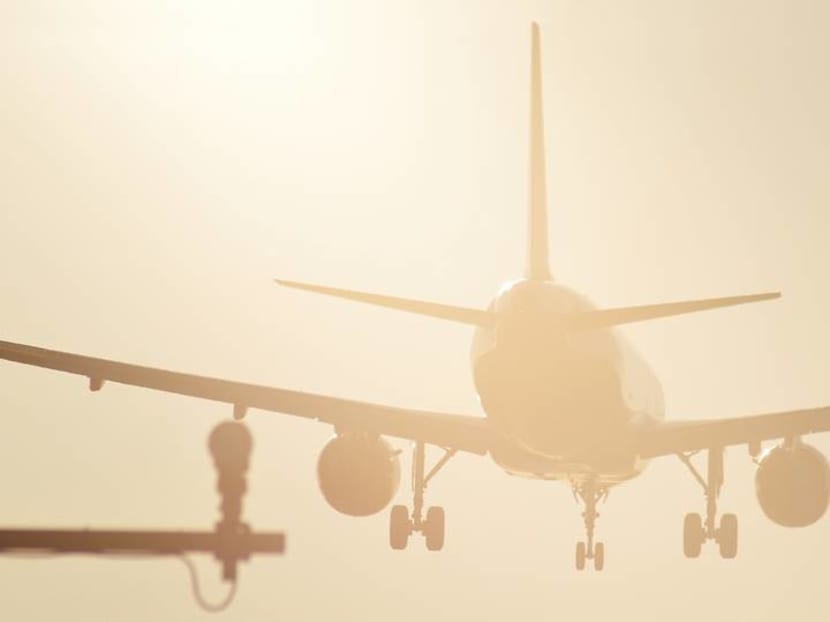Could sustainable fuel derived from cooking oil help aviation navigate to a cleaner future?

(Photo: Unsplash/Viktor Forgacs)
SINGAPORE: In 2019, flights produced 915 million tonnes of carbon dioxide (CO2) emissions - or about 2 per cent of all such emissions derived from human sources, according to the figures from the Air Transport Action Group.
Even as the aviation sector is focused on tackling the short term challenges posed by COVID-19, the current crisis provides an opportunity for the industry to define a more environmentally sustainable future, says Finnish biofuel producer and oil refiner Neste.
Sustainable aviation fuels (SAF) will play a major role in this new normal for aviation, said Jonathan Wood, Neste’s Europe and Asia-Pacific vice president for renewable aviation.
The term refers to biofuels that can be derived from a variety of sources, ranging from used cooking oil to agricultural waste.
“In its neat form and over the lifecycle it reduces greenhouse gas emissions by up to 80 per cent compared to fossil jet fuels,” said Mr Wood.
“The use of the fuel reduces local emissions and provides additional climate benefits through reduced particulate emissions,” he added.
One of the advantages of sustainable aviation fuel is that it can be used as a “drop-in fuel”, he noted - meaning it can be used with existing aircraft engines and infrastructure without any further modification.
Neste is currently expanding its Singapore facility to be able to produce up to one million tonnes of sustainable aviation fuel a year by 2023.
READ: Finland's Neste expands Singapore refinery as it taps renewable growth
While the aviation industry has committed to achieving carbon neutral growth from this year and a 50 per cent reduction in net CO2 by 2050, more ambitious targets are needed, said Mr Wood.
Other solutions, such as electric aircraft, are still in the early stages of development, he pointed out.
“With respect to new aircraft technology, hydrogen propulsion is estimated by OEMs (original equipment manufacturers) not to be available before the 2030s, and electric aircraft are expected only to be feasible for smaller aircraft on shorter routes,” he said.
Solutions that directly cut carbon emissions from flying are needed before then, and as such there is a growing need for sustainable aviation fuels, he said.
READ: US EPA proposing first-ever airplane emissions standards
SCALING UP
Neste is scaling up production of HEFA (Hydrotreated Esters and Fatty Acids) solutions, as well as investing in new technologies and feedstocks for the production of sustainable aviation fuel, he said, noting its focus in areas such as algae oils and municipal solid waste as sources.
Mr Wood notes that in the last year, Neste’s sustainable aviation fuel has been sold to seven airlines across different regions, including Lufthansa, American Airlines and ANA.
Neste also recently signed an agreement with Shell to increase the supply of sustainable aviation fuel.

About 100 million litres of sustainable aviation fuel is produced annually - though this is just 0.1 per cent of all the jet fuel used by the industry in a typical year.
READ: Airlines were tackling their greatest environmental challenges, then they were grounded by COVID-19
One of the factors possibly discouraging greater take up of the fuel is cost, with it costing two to four more times the price of fossil fuels.
The International Air Transport Association (IATA) has called on governments to support sustainable aviation fuel through investments and incentives.
Stimulus investments could push its production to make up 2 per cent of all jet fuel used annually, which could make sustainable aviation fuel more price competitive against conventional jet fuel, said IATA.
Closer to home, in 2011 Singapore Airlines became a member of the Sustainable Aviation Fuels User Group - an industry group which aims to promote the development and commercialisation of sustainable alternative fuels for aviation - and undertook its first flight using sustainable fuels in 2017.
And earlier this year, former Senior Minister for Transport Lam Pin Min said Singapore would study the use of sustainable aviation fuels here.
“The Government and the industry players are studying different business and technological models to enable economically viable and sustainable SAF supply chains in Singapore,” said Dr Lam in March.
Still, some have questioned how sustainable such fuels really are.
In a recent analysis piece for CAPA - Centre for Aviation’s journal Airline Leader, Chris Lyle, the chief executive of consultancy Air Transport Economics, said there is “no clear definition of what makes an aviation fuel a sustainable one”.
“Studies of life-cycle emissions suggest that jet fuels produced from sugar and starch feedstocks deliver small emission benefits, while vegetable oil-based feedstocks can have even higher carbon intensities than conventional jet fuel,” he writes.
Mr Lyle pointed to the potential of synthetic fuels made through the power-to-liquid (PtL) process, where renewable electricity and CO2 can be converted into liquid fuels, which can reduce carbon emissions to almost zero depending on the power source.
These can be manufactured at the point of delivery and take up much less land for production than any biofuels, he said, though he notes the high cost and large amounts of renewable energy needed.
However, Mr Wood noted that the 80 per cent reduction in greenhouse gas emissions generated by sustainable aviation fuels has been independently verified by organisations such as the International Civil Aviation Organization and the Roundtable on Sustainable Biomaterials.
“Neste is committed to full transparency of these calculations and end to end traceability of all waste and residue feedstocks."





